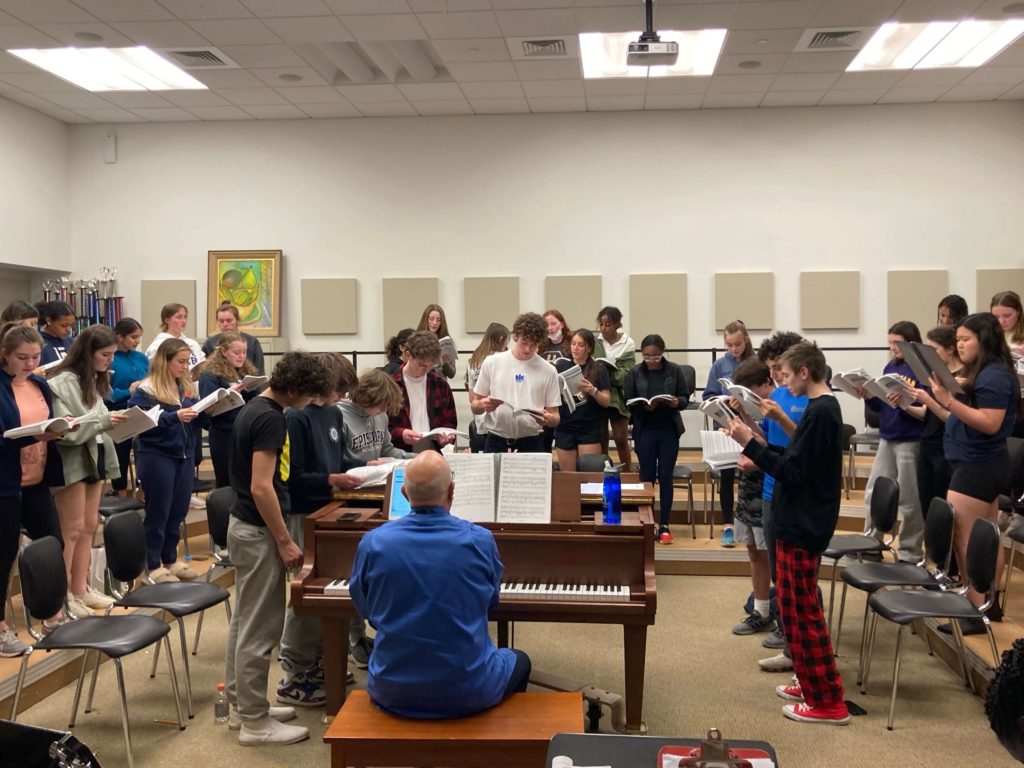Delaney Welsh ‘24
EA’s Spring musical, Mamma Mia! held performances through Thursday, April 28th to Saturday, April 30th. The process of casting a musical is in-depth and includes a regular audition and callbacks.
Before the musical is ready to perform in front of the EA community, a lot of work must be done by both the directors and actors. Daniel Clay, Middle and Upper School Theater Department Chair and teacher, explains that “way before practicing or even auditions, preliminary meetings are held before holiday break, [and] we require the [potential actors] to be at the meetings just so they can get all of the information about rehearsals, how the musical works, and how to auditions are going to work.”

Photo courtesy of Gianna Trala ‘23
One aspect that the potential actors have to be aware of is the time commitment that being a part of the musical requires. Will Esterhai ‘24, who plays a leading role as Sam Carmichael, says that being part of the musical is “definitely more of a time commitment than sports. However, it all pays off in the end and is worth it because it is a lot of fun.” Esterhai, along with other actors with bigger parts, attends rehearsal six times a week. During the school week, these run from around three pm to six pm, with a Thursday practice until nine-thirty PM. In addition, the cast and crew have rehearsals from 12 to six PM.
For students who still want to participate in spring sports, there is an option to have a smaller role and dedicate fewer hours to the musical. Gardner Huston ‘25 plays both a role in the musical and is a member of the softball team. During the week, she attends softball practice and rehearsal on Thursday and Sunday evenings. Huston explains that, although she is there for two days, she remarks, “it is still an amazing experience.”
Following the Winter holiday break, an audition panel consists of Gina Tomkowich, Middle School Drama Teacher and Middle School Dance Head Coach; Matthew Dotzman, Lower School Drama Teacher; two dance choreographers; James Erwin, Music Department Chair and Choir Teacher; and Clay. The panel holds three nights of auditions: one for freshmen and sophomores, the next for upperclassmen, and a final third day for those who could not attend the other auditions.
The auditions begin with each student individually singing a song from a selected group of pieces from the show. The dancing portion of the audition allows students to dance in a group, performing a combination that they learn that day. The panel allows those who are auditioning to read for the part that they want first, but as callbacks arrive students are assigned roles to perform.
Mia Cabral ‘22 comments on this audition experience, “For the musical auditions, you usually have to sing one song by yourself, then learn small choreographed dance section and perform it in small groups, and then usually Mr. Clay makes you act out the scene of the person you’re auditioning for, either by yourself or with partners. It is a nerve-racking process which can be difficult.”
The following weekend is callbacks, which Clay describes as “a longer audition process where they are singing a full song, we are reading them in combinations of people. There is not any dancing at the callbacks but it is really a focus on whether they can act, how well they can act, how they look with each other, and especially whether they can sing the range that we need them to sing.” In order to decide casting, actors are scored by each member of the audition panel in certain categories. The scores are then added up to reveal who is the strongest performer in each area.
Clay explains casting, noting, “There’s a lot of factors that go into the decision, but one of the factors is who do we have, where does our talent lie?” However, it is important to understand that Clay does not precast, saying, “We are not precasting. We don’t go in choosing a show for a particular person.” The number of actors or the talent they have in dance, for example, may influence the selection of a certain show. Other determining factors that Clay references are, “What are the stories that we want to tell the community? What are the stories that the students want to explore? What types of musicals haven’t we done before? What’s going to draw people to come to see it? What is going to be exciting for the students? And also technically, what we can or can’t do.”
Whether students wish to audition for a lead role, ensemble, or part-time with a sport, the musical is a great opportunity for students to explore singing, dancing, and acting. Sarah Memmo ‘24 comments, “It’s been exciting getting to see the show finally come together so far during tech week with the addition of costumes, lighting, the set, and the band and we’re all looking forward to our upcoming performances.”